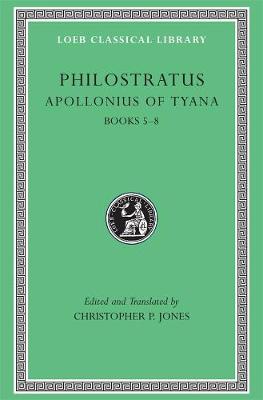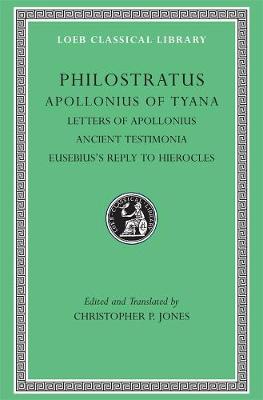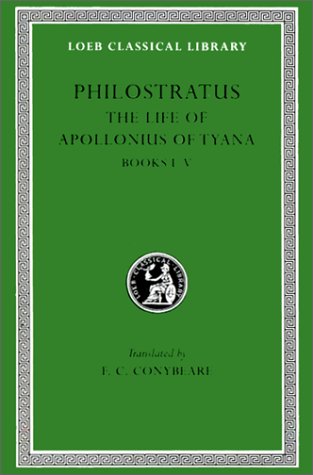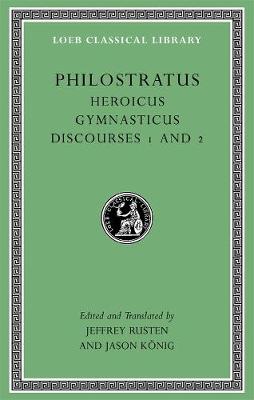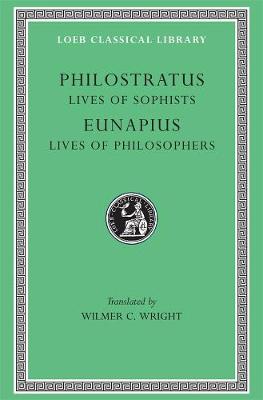Loeb Classical Library
2 primary works • 5 total works
Book 17
This biography of a first-century CE holy man has become one of the most widely discussed literary works of later antiquity. With an engaging style, Philostratus portrays a charismatic teacher and religious reformer from Tyana in Cappadocia (modern central Turkey) who travels across the known world, from the Atlantic...
Read moreThis biography of a first-century CE holy man has become one of the most widely discussed literary works of later antiquity. With an engaging style, Philostratus portrays a charismatic teacher and religious reformer from Tyana in Cappadocia (modern central Turkey) who travels across the known world, from the Atlantic to the Ganges. His miracles, which include extraordinary cures and mysterious disappearances, together with his apparent triumph over death, caused pagans to make Apollonius a rival to Jesus of Nazareth.
In a new three-volume Loeb Classical Library edition of Philostratus's third-century work, Christopher Jones provides a freshly edited Greek text and a stylish translation with full explanatory notes. Apollonius of Tyana is by far the longest biography that survives from antiquity. Jones in his Introduction asks how far it is history and how far fiction, and discusses its survival from Late Antiquity to modern times.
Book 458
Philostratus's colorful biography of Apollonius of Tyana, recounting the sayings and miracles of a Pythagorean sage, incidentally provoked a long-lasting debate between pagans and Christians. This volume, which completes the new Loeb Classical Library edition of the Life of Apollonius of Tyana, provides historical context for that much discussed...
Read morePhilostratus's colorful biography of Apollonius of Tyana, recounting the sayings and miracles of a Pythagorean sage, incidentally provoked a long-lasting debate between pagans and Christians. This volume, which completes the new Loeb Classical Library edition of the Life of Apollonius of Tyana, provides historical context for that much discussed third-century portrayal of a charismatic religious teacher.
Here is a new translation of the surviving letters of Apollonius, augmented and illuminated by recent discoveries. These letters reveal Apollonius's personality and his religious and philosophical ideas. New for this edition is a selection of ancient reports about Apollonius from authors such as St. Jerome and St. Augustine.
Philostratus's biography was quickly caught up in the religious struggles that marked the rise of Christianity. An official in Diocletian's empire named Hierocles used it as ammunition in an anti-Christian polemic, initiating a controversy that lasted well into modern times. The reply by Eusebius, the fourth-century bishop of Caesarea, was originally included in editions of the Life of Apollonius in order to serve as a spiritual antidote and to provide cover for the publishers; today it is an essential chapter in the history of Philostratus's masterpiece.
No 16
In the writings of Philostratus (ca. 170-ca. 250 CE), the renaissance of Greek literature in the second century CE reached its height. His Life of Apollonius of Tyana, Lives of the Sophists, and Imagines reconceive in different ways Greek religion, philosophy, and art in and for the world of...
Read moreIn the writings of Philostratus (ca. 170-ca. 250 CE), the renaissance of Greek literature in the second century CE reached its height. His Life of Apollonius of Tyana, Lives of the Sophists, and Imagines reconceive in different ways Greek religion, philosophy, and art in and for the world of the Roman Empire. In this volume, Heroicus and Gymnasticus, two works of equal creativity and sophistication, together with two brief Discourses (Dialexeis), complete the Loeb edition of his writings.
Heroicus is a conversation in a vineyard amid ruins of the Protesilaus shrine (opposite Troy on the Hellespont), between a wise and devout vinedresser and an initially skeptical Phoenician sailor, about the beauty, continuing powers, and worship of the Homeric heroes. With information from his local hero, the vinedresser reveals unknown stories of the Trojan campaign especially featuring Protesilaus and Palamedes, and describes complex, miraculous, and violent rituals in the cults of Achilles.
Gymnasticus is the sole surviving ancient treatise on sports. It reshapes conventional ideas about the athletic body and expertise of the athletic trainer and also explores the history of the Olympic Games and other major Greek athletic festivals, portraying them as distinctive venues for the display of knowledge.
Lives of the Sophists. Eunapius: Lives of the Philosophers and Sophists
by Eunapius and Philostratus
Of the distinguished Lemnian family of Philostrati, Flavius Philostratus 'the Athenian', ca. 170 205 CE, was a Greek sophist who studied at Athens and later lived in Rome. He was author of the admirable Life of Apollonius of Tyana (Loeb nos. 16 and 17) and of Lives of the...
Read moreOf the distinguished Lemnian family of Philostrati, Flavius Philostratus 'the Athenian', ca. 170 205 CE, was a Greek sophist who studied at Athens and later lived in Rome. He was author of the admirable Life of Apollonius of Tyana (Loeb nos. 16 and 17) and of Lives of the Sophists, a treasury of information about notable sophists. Philostratus's sketches of sophists in action yield a fascinating picture of the predominant influence of Sophistic in the educational, social, and political life of the Empire in the second and third centuries.
The Greek sophist and historian Eunapius was born at Sardis in 347 CE, but went to Athens to study and lived much of his life there teaching rhetoric and possibly medicine. He was initiated into the mysteries and was hostile to Christians. His Lives of Philosophers and Sophists (mainly contemporary with himself) is our only source for knowledge of Neo-Platonism in the latter part of the fourth century.
